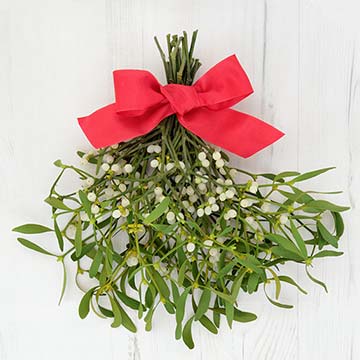 The berries of holly and other plants are poisonous, but can be mistaken for candy by kids. If the berries
The berries of holly and other plants are poisonous, but can be mistaken for candy by kids. If the berries
fall on the floor, pets can be poisoned if they ingest them.
©Jo Ellen Meyers Sharp
Mantels, dining tables, front doors or the corner in the family room cry out for something natural – or natural looking – this time of year.
Answer the cry with branches, garlands, berries, trees and other greenery to deck the halls for the holidays. Add to that some flowers, such as poinsettias, amaryllis or paper white narcissus, and you’re ready to celebrate.
Cuttings from the landscape are fresher than anything you can buy. Pine, juniper, arborvitae, spruce, fir, red or yellow stem dogwoods, boxwood, willow and birch branches are good choices. Try not to take too many branches from any one plant this time of year.
What you can’t find in the yard, you should be able to pick up at the garden center, florist or produce department at the local grocer. Craft stores have faux or dried versions of all things natural, too.
Some caution is needed when decorating with evergreens, berries and other plants, especially if children and pets are in the house. As few as 20 red or blue berries from holly can kill a child, according to the American Association of Poison Centers. Children often mistake the berries from holly, mistletoe, yew and bittersweet for candy. Dogs, well, they eat anything, and a cat may nibble on berries or leaves before turning away.
 Mistletoe plant
Mistletoe plant
Oriental and native bittersweet, European mistletoe, Eastern U.S. native mistletoe and Jerusalem cherry are toxic, too. So are those luscious red berries of yews. Contrary to popular belief, poinsettias are not poisonous but they can be mildly toxic. While not meant to be eaten, poinsettias can cause mild signs of drooling, vomiting, and intestinal discomfort if somehow ingested.
Cut branches last longer indoors when kept in a cool place, out of direct sunlight and away from drafts of heat and cold. That includes appliances and electronics, which can give off a lot of heat. Even reducing the temperature at night can help. Branches also can be placed in a vase of water to keep them fresh.
If you think a person or a pet may have ingested something that could be toxic, immediately call the American Association of Poison Control Centers, 800-222-1222. There are 55 poison centers in the U.S., and your call will be routed to the center that serves you, based on your area code and exchange.